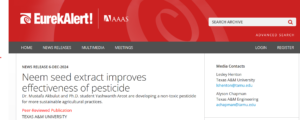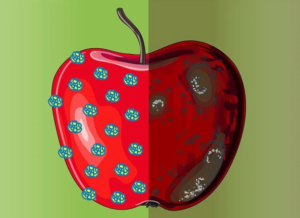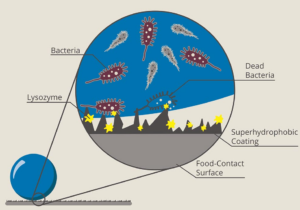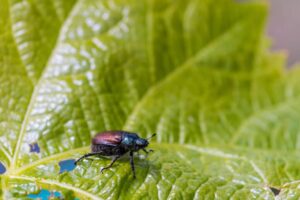Source: Texas A&M Today, January 2025
Dr. Mustafa Akbulut and Ph.D. student Yashwanth Arcot are developing a non-toxic pesticide for more sustainable agricultural practices.
Coatings and Interface Science Lab
The Akbulut Lab
Posted on by makbulut
Source: Texas A&M Today, January 2025
Dr. Mustafa Akbulut and Ph.D. student Yashwanth Arcot are developing a non-toxic pesticide for more sustainable agricultural practices.
Posted on by makbulut

https://www.eurekalert.org
https://phys.org/
https://www.techexplorist.com
https://www.kxxv.com/news
Akbulut and his research group have developed an innovative pesticide delivery system called nanopesticides. These tiny technologies, developed through a collaboration between Texas A&M University’s engineering and agricultural colleges, Dr. Luis Cisneros-Zevallos, professor of Horticultural Science and Dr. Younjin Min, professor of Chemical and Environmental Engineering at University of California, Riverside, could change how we use pesticides.
The team studied different types of nanopesticide carriers, testing their “stickiness” to pepper leaves, a representative model for many important crops. They discovered that the carrier’s surface chemistry plays an important role in how well the nanopesticide adheres to the plant.
Nanopesticides encapsulate the active pesticide ingredients within microscopic carriers. Think of it like delivering a targeted package directly to the pest, minimizing collateral damage. This research focused on understanding how these nanopesticides interact with plant surfaces, a crucial step in maximizing their effectiveness.
Pesticides are essential for protecting crops from pests and diseases, and without them, we would lose a huge portion of our harvests – up to 70-80% of fruits, 40-50% of vegetables, and 20-30% of cereals.
However, current pesticide application methods are incredibly inefficient. More than 80-90% of sprayed pesticides miss their target entirely, ending up in the environment where they can cause harm. This waste is not only bad for the planet, but it is also economically unsustainable.
This compound, which Akbulut and Yashwanth Arcot, Ph.D candidate discuss in their paper published in Surfaces and Interfaces Journal, is a mixture of Ethyl Lauroyl Arginate (ELA), a food preservative compound, and neem seed extract.
Arcot’s interest in the research focuses on nanopesticide chemistry to ensure a higher targeting ability and the strong correlation between the nanopesticide carrier and its adsorption behavior.
Akbulut believes that by using nanopesticide, he can increase the efficacy by better targeting the plant surface. Akbulut and his team aim to achieve this by taking various pesticides and modifying their interfacial properties using carriers that are best suited to interact with the plant surface characteristics.
Overall, the goal of the research is to find a way for more efficient and environmentally friendly pesticide formulations that are sustainable for agricultural practices and global food security.
“This study addresses a critical challenge in sustainable agriculture by optimizing nanopesticide systems to enhance efficacy, reduce environmental pollution, and minimize impacts on non-target organisms and human health,” Arcot said.
Neem seed is a naturally occurring pesticide that comes from the seeds of the neem tree and is used to control pests and diseases on crops. The extract from a neem seed tree grows mostly in India but is organic pesticide management.
“Organic pesticides use this formulation, and we also use this molecule in the center. Although the carriers are different, the active ingredient inhibits or inactivates the pest.”
According to the paper, among various types of pesticides, nanopesticides have shown to be an advanced crop protection strategy that relies on agricultural technology, nanotechnology, and materials chemistry.
Akbulut said this discovery has profound implications for the future of agriculture. By tailoring the surface chemistry of nanopesticides, scientists can optimize their effectiveness, ensuring that more of the pesticide reaches the target pest and less ends up polluting the environment.
“For farmers or industry who are using the pesticides, they will clearly understand the value of this research,” Akbulut said. “Pesticides, in general, are considered bad for the environment, using neem seed extract ensures crop survival from pests and is non-toxic for consumption.”
Posted on by makbulut
Source: News Medical, AZoNetwork, March 2024
In a collaborative effort to improve the food industry, Dr. Mustafa Akbulut, professor of chemical engineering, and Dr. Luis Cisneros-Zevallos, professor of horticultural science, have developed a two-step coating solution for galvanized steel that is more hygienic and reduces the risk of corrosion. https://www.news-medical.net/news/20240301/Innovative-coating-solution-enhances-hygiene-and-reduces-corrosion-in-food-storage.aspx
Posted on by makbulut
Source: AZoNano, February 2024
To engineer produce that lasts longer and is free of bacteria, chemical engineering professor Dr. Mustafa Akbulut and professor of horticultural science Luis Cisneros-Zevallos have teamed up. https://www.azonano.com/news.aspx?newsID=40743
Posted on by makbulut
Source: SciTech Daily, April 2020
Texas A&M researchers have created a coating that can be applied to surfaces like conveyor belts and collection buckets. https://scitechdaily.com/new-dual-action-coating-invented-to-prevent-bacterial-cross-contamination-of-fresh-produce/
Posted on by makbulut
Source: 15 ABC KRHD, January 2025
Led by Dr. Mustafa Akbulut, a professor of chemical engineering, the team has created nanopesticides—tiny technologies designed to enhance how pesticides stick to plant surfaces. https://www.kxxv.com/news/local-news/in-your-neighborhood/brazos-county/texas-a-m-university/texas-a-m-engineering-researchers-create-eco-friendly-pesticide
Posted on by makbulut
Source: Tech Explorist, December 2024
Researchers are developing a non-toxic pesticide for more sustainable agricultural practices. https://www.techexplorist.com/neem-seed-extract-ensures-crop-survival-from-pests/94320/